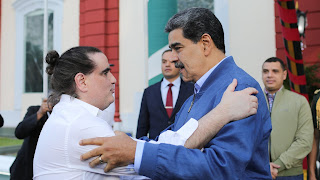Prisoners as Bargaining Chips: A Looming Danger for All
The recent release of Alex Saab, identified as the top money launderer for Venezuela's dictator Nicolás Maduro, has sparked concerns about the direction of U.S. rescue diplomacy. This trend, marked by often opaque agreements and the exchange of high-profile individuals, raises serious concerns about international security and the integrity of the justice system.
Set against the backdrop of the Barbados Agreement, where the Biden administration and the Maduro regime engaged in negotiations, controversies have emerged. While aimed at lifting sanctions in exchange for concessions from the Venezuelan regime, recent terms have stirred confusion and mistrust among Venezuelan society.
The emerging pattern of exchanges, such as the release of Saab and the prior release of Maduro's nephews in exchange for American prisoners, signals a dangerous precedent. This is exacerbated by the recent release agreement between the U.S. and Iran, where a U.S. prisoner was traded for unlocking substantial funds.
This series of exchanges, seemingly circumventing established legal procedures, poses an evident risk. The possibility of tyrannical regimes and criminal organizations adopting similar tactics to gain concessions from the U.S. administration becomes increasingly alarming.
In the current complex geopolitical landscape, encompassing conflicts in the Middle East, tensions with Russia, and the presence of Mexican cartels, American citizens may find themselves in varied roles. Whether directly involved or coincidentally present, this diverse involvement heightens the potential for being targeted for kidnappings aimed at influencing U.S. policies.
Rescue diplomacy, while a tool in delicate situations, raises serious concerns about the consistency of foreign policies and the defense of international justice. The international community must carefully evaluate these practices as they could foster a dangerous dynamic of selective kidnappings to pressure democratic governments.
Far from being a mere response to crisis situations, this pattern of exchanges could set a precedent that threatens the safety of American citizens and the stability of international relations in the future.
Julio César Rivas




Comentarios